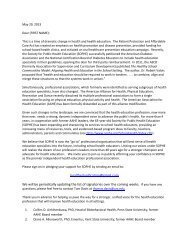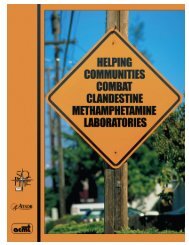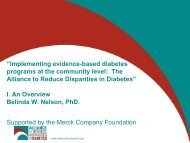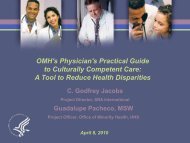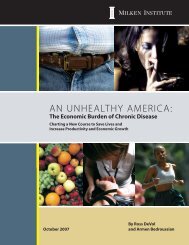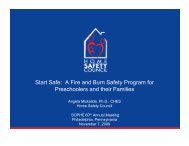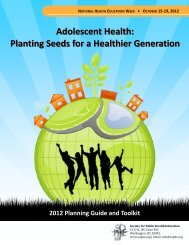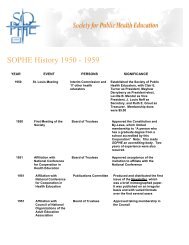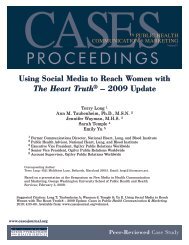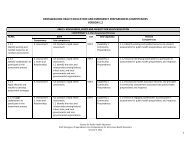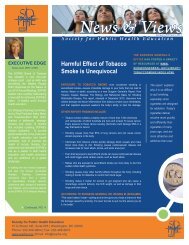to view the program - Society for Public Health Education
to view the program - Society for Public Health Education
to view the program - Society for Public Health Education
You also want an ePaper? Increase the reach of your titles
YUMPU automatically turns print PDFs into web optimized ePapers that Google loves.
proven or promising interventions in specific populations. Each<br />
Network will build capacity in communities by recruiting individuals<br />
and organizations <strong>to</strong> facilitate learning and in<strong>for</strong>mation sharing across<br />
and within network participants. Tribal Support Centers reduce commercial<br />
<strong>to</strong>bacco use and abuse among American Indian and Alaska<br />
Native tribal members; eliminate exposure <strong>to</strong> secondhand smoke;<br />
promote commercial <strong>to</strong>bacco cessation; and prevent youth initiation<br />
<strong>to</strong> commercial <strong>to</strong>bacco use. Methods: In 2007, <strong>the</strong> Center <strong>for</strong> Tobacco<br />
Policy Research at Washing<strong>to</strong>n University in St. Louis was funded by<br />
<strong>the</strong> CDC <strong>to</strong> conduct an evaluation of <strong>the</strong> National Tobacco Control<br />
Networks <strong>for</strong> Priority Populations. One of <strong>the</strong> primary goals of <strong>the</strong><br />
National Networks evaluation was <strong>to</strong> examine <strong>the</strong> relationships among<br />
<strong>the</strong> core strategic network partners. The networks were evaluated based<br />
on <strong>the</strong> following per<strong>for</strong>mance measures: <strong>program</strong> and fiscal management,<br />
communication with partners, training and technical assistance,<br />
and <strong>program</strong> evaluation. JCW Research & Evaluation Group, Inc.<br />
evaluated <strong>the</strong> Tribal Support Centers using <strong>the</strong> MPOWER framework<br />
created by <strong>the</strong> World <strong>Health</strong> Organization that outlines 6 policy<br />
strategies that encompass a comprehensive <strong>to</strong>bacco control <strong>program</strong>.<br />
Results: The National Tobacco Control Networks <strong>for</strong> Priority<br />
Populations and Tribal Support Centers have expanded <strong>the</strong> reach<br />
of <strong>the</strong> Office on Smoking and <strong>Health</strong> (OSH). These initiatives have<br />
created linkages with traditional and nontraditional organizations that<br />
serve <strong>the</strong>ir populations, which have been beneficial in state, tribal, and<br />
local policy ef<strong>for</strong>ts. OSH is using <strong>the</strong> evaluation results <strong>to</strong> guide <strong>the</strong><br />
ongoing implementation of <strong>the</strong> <strong>program</strong>s. However, fur<strong>the</strong>r examination<br />
of <strong>the</strong> <strong>program</strong> and discussion with participants will fur<strong>the</strong>r<br />
examine future directions and opportunities.<br />
Concurrent Session A4<br />
SOPHE Leadership Development<br />
Partnering <strong>for</strong> <strong>Health</strong>: Creating and Sustaining Action-Learning<br />
Collaboratives with Key Stakeholders<br />
Claire Sherry Immedia<strong>to</strong>, MPP, MBA, President, Heaven & Earth<br />
Incorporated<br />
One of <strong>the</strong> largest challenges we face in our complex world is that <strong>the</strong><br />
results that we care about most are not something that one organization<br />
can achieve alone. In addition, complex and dynamic issues<br />
are most successfully addressed with an experimental approach that<br />
acknowledges that we are in new terri<strong>to</strong>ry and must learn as we go.<br />
This session will provide a simple action-learning model with examples<br />
of ga<strong>the</strong>ring <strong>the</strong> “whole system” in a way that builds relationships<br />
that last by addressing short term issues systemically.<br />
Concurrent Session B<br />
10:30 AM - 12:00 PM<br />
Concurrent Session B1<br />
Regional Approaches <strong>to</strong> Reducing<br />
<strong>Health</strong> Disparities: Partnering <strong>to</strong><br />
Promote <strong>Health</strong>y Aging<br />
Using a Regional Approach, New Mexico and Texas Work <strong>to</strong><br />
Address <strong>Health</strong> Disparities along <strong>the</strong> Border through Evidence-<br />
Based Programs and Policy and Systems Change- As Seen From a<br />
Regional Perspective<br />
Sue Lachenmayr, MPH, National Council on Aging - Center For<br />
<strong>Health</strong>y Aging; Fern Goodhart, MPH, Staff <strong>to</strong> Honorable Sena<strong>to</strong>r<br />
Tom Udall of New Mexico<br />
Background: More than 1.7 million Americans die of a chronic disease<br />
each year. Eighty percent of older adults have at least one chronic<br />
condition; 50% at least two. For minorities and people with low<br />
income, <strong>the</strong> prevalence of chronic conditions and functional loss is<br />
even greater. In 2011, 25% of seniors with 4 or more chronic conditions<br />
will spend 80% of nation’s $2.8 trillion healthcare dollars. Only<br />
1% of health dollars are spent on public health ef<strong>for</strong>ts <strong>to</strong> improve<br />
overall health. Despite evidence that prevention works, few take<br />
advantage of strategies <strong>to</strong> prevent chronic disease even when behavioral<br />
risk fac<strong>to</strong>rs account <strong>for</strong> about 75% of chronic disease. A national<br />
ef<strong>for</strong>t through <strong>the</strong> U.S. Administration on Aging (AoA), Centers<br />
<strong>for</strong> Medicare and Medicaid Services, and <strong>the</strong> Centers <strong>for</strong> Disease<br />
Control and Prevention is coordinating ef<strong>for</strong>ts <strong>to</strong> maximize <strong>the</strong> use<br />
of proven self-care management services and bring <strong>to</strong> scale evidencebased<br />
activities <strong>to</strong> improve efficiency, quality and costs. The National<br />
Council on Aging (NCOA) is <strong>the</strong> technical assistance center <strong>for</strong> 45<br />
states DC and Puer<strong>to</strong> Rico, funded by AoA through <strong>the</strong> Recovery<br />
Act, tasked with assisting <strong>the</strong> grantees <strong>to</strong> reach 52,000 completers in<br />
<strong>the</strong> Stan<strong>for</strong>d University Chronic Disease Self-Management Program<br />
(CDSMP) and <strong>to</strong> create sustainable statewide delivery and distribution<br />
systems <strong>for</strong> evidence-based prevention <strong>program</strong>s by April 2012.<br />
Theoretical basis and interventions: Bandura’s Theory of Self Efficacy<br />
is utilized through highly interactive 6-week lay leader led skill-based<br />
group workshops in community settings. Increasing self-efficacy <strong>to</strong><br />
rein<strong>for</strong>ce individuals’ beliefs is essential <strong>for</strong> <strong>the</strong>m <strong>to</strong> per<strong>for</strong>m behaviors<br />
that can assist <strong>the</strong>m in self-management of <strong>the</strong>ir chronic condition(s).<br />
Evaluation measures and results: NCOA, Stan<strong>for</strong>d University and<br />
Texas A&M are conducting a national study <strong>to</strong> repeat replicability<br />
of Lorig et al. 1999 original research findings, including: significant<br />
improvements in exercise, cognitive symp<strong>to</strong>m management, communication<br />
with physicians, self-reported general health, health distress,<br />
fatigue, disability, and social/role activities limitations. They also spent<br />
fewer days in <strong>the</strong> hospital, and <strong>the</strong>re was also a trend <strong>to</strong>ward fewer<br />
22<br />
SOPHE-NACDD 2011 Joint Academy and Midyear Scientific Meeting




